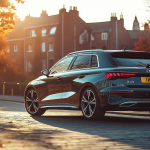So, you’ve just passed your driving test and are ready to enjoy the freedom of the roads. Or maybe you’re looking to get away from being a named driver on your parents’ car and go it on your own. Whatever your reason for buying a car, the process of getting one can be rather daunting, particularly if it’s your first venture into the market.
With approximately a gazillion choices available to you covering every body type, fuel type, budget, colour scheme and just about every other possible element you can think of, where do you even begin? Here are four basic pointers that’ll help round your search down massively.
What are your needs?
What are you going to be using your car for? Need a simple A to B runner for work and the shops, or a spacious family car for the school run and four-man holidays? Likewise, do you have any special needs to be considered, or certain requirements that would rule specific vehicles out?
These are all very basic questions, but very important ones in initially narrowing down your search. Thinking about what you would want from your car will help identify vehicle types that do and don’t make sense for your life, which should round things down quite well straight off the bat.
What’s your budget?
The age-old question when buying a car, and one that will limit your search – but that’s a good thing. Once you know what car types to look for, stacking up them up against your budget will give you an idea where the best value lies – for example, it’s probably better to buy a hatchback in good condition over an older, battered saloon if the former will do the job for you.
It’s important to remember that your budget boils down to much more than the upfront cost of your new car. When you consider factors like insurance, road tax, maintenance and services charges and other regular running costs as part of your overall budget, you’ll get a much better idea of what sort of cars you can really afford.
Affording your first car can be the biggest challenge in buying it. You might be drawing from carefully built savings, taking advantage of short-term loans or calling on the bank of mum and dad. Whatever you do, we’d recommend not going overboard with that initial purchase, and that should help narrow your choice down.
Petrol, diesel or electric?
The petrol vs diesel vs hybrid vs electric question has been one long in the making, but we’re really getting to crunch time now on whether in 2021 it’s better to buy a traditional, combustion powered vehicle or an electric one. That’s because electric cars are becoming more accessible price wise (while still being relatively expensive), offer obvious futureproofed qualities and boast significantly lower running costs once purchased.
With that all said, petrol and diesel cars are still significantly cheaper to buy, and most people with a typical budget won’t be able to afford an EV right now, even if they want to. If you’re on the fence about which way to go, the debate right now largely comes down to the upfront cost benefits of petrol/diesel cars versus EVs doing just about everything else better.
Often, the former is the biggest factor, but that’s a decision for you to make.
New or used?
Like the petrol vs electric debate, new vs used largely boils down to cost factors, but the consensus is fairly firmly on the side of buying used – especially if it’s your first car and you’re working to a budget. If you are buying a new car on a budget, you’ll in all likelihood be doing so on a finance deal. Before you get into any finance contract, make sure you’re able to keep up with the payments and see out your contract.
Buying a car can seem like a mammoth prospect, but if you take into account the above, none of which is rocket science, you should find it easier to narrow down your search. Perhaps the best thing to remember when buying a car is there are plenty of cars that will do a good job for you rather than there only being one perfect option for you. When you look it that way, you should feel more comfortable pulling the trigger on a purchase, and the chances are you’ll have made a decent decision.






































